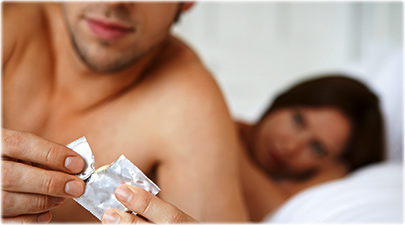Although you may not know it, herpes could be a grave matter. Even though it is not fatal, the patients have to bear the consequences till their last breath. And honestly speaking, all that extra mental and physical stress gets too much to handle at some point or another. So, what could be done? If you have contracted the disease already, it truly is unfortunate and you will need to keep vigil at all times; you do not want to spread the infection to others or cause yourself to experience more pain than you already are in. However, if you have NOT contracted the illness, stay alert and always keep yourself protected.
 Since herpes is a sexually transmitted disease, you will need to be protected during sexual intercourse at all times, especially if your partner has genital herpes. Probably the best way to keep yourself safeguarded is by making use of condoms during sexual intercourse. Although, new study discoveries show that condoms merely reduce the risk of acquiring genital herpes from others, but does not completely eliminate the chances. How is that possible, you ask? Researchers carried out polls and have found that individuals who use condoms steadily have about 30% reduced risk than those who do not use them. This is disappointing when we consider how condoms work better in terms of preventing the contraction of the HIV virus. This 30% is only because herpes is from skin contact, which means even the area that is not covered by the condom could help spread the infection.
Since herpes is a sexually transmitted disease, you will need to be protected during sexual intercourse at all times, especially if your partner has genital herpes. Probably the best way to keep yourself safeguarded is by making use of condoms during sexual intercourse. Although, new study discoveries show that condoms merely reduce the risk of acquiring genital herpes from others, but does not completely eliminate the chances. How is that possible, you ask? Researchers carried out polls and have found that individuals who use condoms steadily have about 30% reduced risk than those who do not use them. This is disappointing when we consider how condoms work better in terms of preventing the contraction of the HIV virus. This 30% is only because herpes is from skin contact, which means even the area that is not covered by the condom could help spread the infection.
Emily Martin of the University of Washington and Children’s Hospital Research Institute has explained that even though the 30% may seem less, it could have a huge positive impact on the human population, if they only swear to make use of condoms.
There was a study conducted on 5000 people who made use of condoms, whether consistently or every now and then. In this experiment, it was found that there was no big difference in the degree of protection, between men and women. The researchers also discovered that even people who did not religiously use condoms got an increased level of security from using condoms, as long as they made sure to wear one for all sexual acts.
To conclude this matter, experts highly recommend the use of condoms, regardless of the type of sexual act they are participating in. In this way, you get added protection from genital herpes, which in turn guards all those who you are sexually active with. It is a good cycle that must be kept going.
Continue to read about Top 10 Questions About Herpes Answered.
